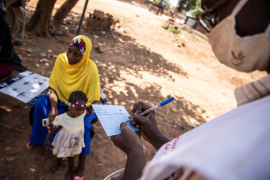Under the RBM Partnership’s strategic objective 1, “Keeping malaria high on the political agenda”, the Advocacy and Resource Mobilisation Partner Committee (ARMPC) works towards engaging existing parliamentary groups on malaria, as well as supporting the creation and establishment of new parliamentary interest groups in donor and endemic countries that may be specific to malaria or include other health areas, such as NTDs or vector-borne diseases. To support this effort, the ARMPC has identified the need to create a “guidebook” containing practical tools for parliamentarians to raise the profile of malaria in their respective countries.
The Agency will be responsible for the delivery of these expected outputs per requested country:
- Documentation of interview responses and consent forms
- Summaries of case studies that will be included in Guidebook
- Draft Guidebook for RBM Partnership Review
- Final Guidebook for Parliamentarians to be published by RBM
To create this guidebook, RBM Partnership is seeking agency support to:
- Conduct a mapping exercise and research on existing parliamentary interest groups and document the lessons learnt/successes
- Identify relevant stakeholders from each of the constituency groups (eg CSOs) and conduct structured interviews (eg, via teleconference) to locate best practices and challenges
The guide should be designed around the main areas in which parliamentarians can effect change:
- Develop and pass budgets for the health sector and allied sectors (which may include malaria-smart multi sectoral interventions). This includes domestic support for malaria-endemic countries as well as ODA from donor countries.
- Conduct oversight of funded activities (domestic and ODA).
- Utilize strategic communications to their electorate (local constituency), national audience, and international audiences (including MPs in other countries) to change behaviour and build support for malaria elimination efforts.
- Collaborate with other MPs through international associations (eg, IPU, UNITE, Commonwealth Parliamentary Association, Pan-African Parliament), including joint calls to action, awareness raising, etc. The guidebook should include the following sections:
- How parliamentarians from different groups can work together and organise themselves to raise the profile of malaria in their government
- Country-level case studies on which countries have an existing parliamentary interest group related to malaria, lessons learnt and opportunities for improvement
- How parliamentarians can work with Civil Society Organisations (CSOs) to address malaria
- What can be done to mitigate the impact of global situations that can divert attention and resources away from malaria (eg. When a government is focused on COVID-19, how can we maintain political will and support for malaria programs?) No travel is required. All work is expected to be completed virtually.
